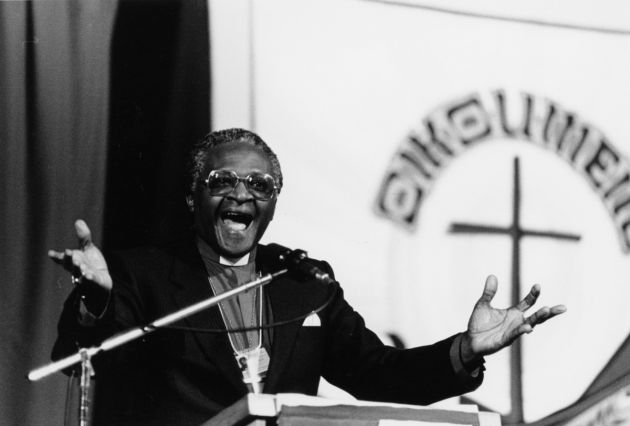South African public protector urges nation to follow model of Christian leaders fighting apartheid

South Africa's Public Protector Thuli Madonsela has called on Christians to act against wrongdoing in State affairs and society in the same way Christian leaders did during the apartheid era.
She cited religious leaders such as Methodist Bishop Peter Storey and the South African Council of Churches who resisted the racist ideology of apartheid for decades.
Madonsela was delivering the annual Peter Storey Memorial Lecture at the Seth Mokitimi Methodist Seminary in Pietermaritzburg, in KwaZulu-Natal province on May 13.
Peter Storey is a South African Methodist minister who is a former president of the Methodist Church of Southern Africa, and of the South African Council of Churches.
He is also the Ruth W. and A. Morris Williams Distinguished Professor Emeritus of the Practice of Christian Ministry at Duke University Divinity School.
Madonsela, the publicly-appointed public protector urged those in the employ of the State to ensure that they operate within the South African Constitution, but she has received death threats and been attacked by members of the ruling party.
She said those working for the State have to maintain a high level of ethics, including avoiding and eliminating conflict of interest and corruption in exercising public power and control over public resources.
Her speech came at a time when she has used her office to criticize State corruption noting how it damages prospects for poorer people by directing resources into the hands of an elite few away from them.
JACOB ZUMA
She has also singled out President Jacob Zuma for dodging accusations of corruption, which has often earned her the wrath of South Africa's ruling African National Congress.
"As many of us battle to cope with the automated or digitalised world referred to as the fourth industrial revolution, others are yet to access the benefits of electricity, which was the main benefit of the second industrial revolution," Madonsela said.
In anger some groups have engaged in arson against public property and educational institutions. She has urged angry youth to address injustice but not to destroy public infrastructure.
"We know you have right to be angry about social injustice. However this is our country. It is not someone else's country," she said in another speech.
"Let us not destroy our own infrastructure. You only destroy the infrastructure of the enemy. We are supposed to be a building generation."
Now in its sixth year, the lecture honours the legacy of Storey, one of South Africa's prominent religious leaders and anti-apartheid activists.
It further seeks to encourage synergies between religious thoughts and approaches to governance, as well as to encourage religious leaders to engage with civic issues and democratic governance.
Madonsela recited a 1960s poem of a white Christian by the name of James Patrick Kinney, titled The Cold Within.
The poem is about looking the other way in the face of human suffering at your own peril in view of the inter-connectedness of humanity.
Madonsela said the best way to repay the debt of gratitude to Storey and his contemporaries for their efforts in the fight for a free South Africa was to choose not to look away in the face of human suffering.
She said Storey chose ethics over comfort and being liked by the powers of the day during apartheid.
He had refused to use racial privilege to climb the ladder of life, instead using racial privilege to make a difference for the oppressed.
Although, 22 years into democracy, a lot had changed for the better, there is still gross human suffering in the country, including among poor students, school pupils, those without medical insurance, unemployed youth, and those struggling to run small businesses, she noted.
"As many of us battle to cope with the automated or digitalised world referred to as the fourth industrial revolution, others are yet to access the benefits of electricity, which was the main benefit of the second industrial revolution," Madonsela said.
The freedom attained in 1994 will remain meaningless for these people if those who work for the State and members of the public "looked the other way."
Madonsela said "meaningful freedom" referred to freedom from poverty and want, violence and crime, and hunger, among several other things.
This kind of freedom further encompasses freedom from corrupt practices, both in the public and private sectors, inequality, and other forms of social injustice such as racism, sexism, xenophobia, and child abuse.
The public protector urged those in the employ of the state to ensure that they operated within the Constitution.
Those working for the State have to maintain a high level of ethics, including avoiding and eliminating conflict of interest and corruption in the exercise of public power and control over public resources.
In addition to state functionaries, members of the public should play their part in consolidating democracy by not being "part of the problem", such as taking part in maladministration, abuse of state power, and corruption, Madonsela said.
Peter Storey's 40-year ministry in South Africa was defined by sustained opposition to the apartheid government and its oppressive racist policies.
He served as chaplain to Nelson Mandela and other political prisoners while they were jailed on Robben Island.
Later, as a Methodist and ecumenical leader he played a significant national role in the Church's anti-apartheid struggle.
He and then Bishop Desmond Tutu were witnesses-in-chief for the South African Council of Chruches when the apartheid regime put the organization on trial.
